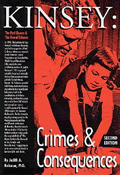Other
Kincaid
Articles:
By Cliff Kincaid
March
9, 2006
NewsWithViews.com
Despite claims that the United Nations is coming to grips with the threat posed by the Iranian nuclear weapons program, the International Atomic Energy Agency resolution that recommended U.N. Security Council action over that program contained a clause affirming a nuclear-free Middle East. It effectively mandates the dismantling of Israel�s secret defensive nuclear weapons arsenal if anything is done about the offensive Iranian program. The resolution was portrayed by our media as a great victory for the U.S. when it was a deadly trap.
Members of the Bush Administration talk tough and repeatedly express the hope that the �international community� will do something about Iran. But the U.N. has always been an anti-Israel body and it is apparent that the Security Council will never authorize military action against Iran as along as Israel has its own nuclear weapons program. These are facts of life, based on an analysis of the U.N.�s history of dealing with Middle East affairs, which few people want to acknowledge.
It�s important to note that some don�t believe in putting pressure on Iran to abandon its nuclear weapons program. Thomas P.M. Barnett, the author of �The Pentagon�s New Map: War and Peace in the Twenty-First Century,� writes that �I choose to see Iran�s reach for the bomb as possibly the best thing that�s happened to the Middle East peace process in decades.�
Barnett is not a leftist by any stretch of the imagination. His bio says that he has been a Senior Strategic Researcher and Professor in the Warfare Analysis & Research Department of the Center for Naval Warfare Studies at the U.S. Naval War College.
Barnett says that Iran�s possession of nuclear weapons would level the �playing field� by �finally allowing the Muslim Middle East to sit one player at the negotiating table as Israel�s nuclear equal.� He predicts, �Iran will get the bomb, no matter how the United States or its allies seek to prevent that outcome.�
He urges a �grand bargain with Iran� in which �Iran gets the bomb, diplomatic recognition, the lifting of sanctions and the opening of trade, and its removal from the axis of evil.� In return, Iran is supposed to stop supporting terrorism and will recognize Israel.
In a leap of faith, Barnett believes that Iran wouldn�t use its nuclear weapons. He asks, �In which scenario do you think Tehran might risk it all by sponsoring a terrorist WMD strike against Israel or the West�when it has something to lose or nothing to lose?�
The flaw in his thinking, of course, is the failure to take into account the religious mind-set of the Iranian president and his top advisers. Barnett seems to assume that the Iranian leaders are rational.
Former President Jimmy Carter has taken a similar approach. Carter has said, �While the international community is justified in exerting strong pressure on Iran to comply with the Non-Proliferation Treaty, there is no public effort or comment in the United States or Europe calling for Israel to comply with the Non-Proliferation Treaty or submit to any other restraints. At the same time, we fail to acknowledge what a powerful incentive this is to Iran, Syria, Egypt, and other states to join the nuclear community.�
What Carter seems to be saying is that Israel must be disarmed of its nuclear deterrent as part of the process of stopping the Iranian nuclear weapons program. That is the U.N. approach as well.
Those who think the U.N. is prepared to take action against the Iranian nuclear program, without doing anything about Israel, should consult a February 2, 2005, article by Mohamed ElBaradei, the director-general of the U.N.�s International Atomic Energy Agency (IAEA). In the article, published in the Financial Times, he argued that �all parties� in the Middle East should pursue �a dialogue on regional security� that would ultimately result in �a nuclear weapons free zone.� That approach was reflected in the resolution on Iran that came out of the IAEA on February 4.
|
Subscribe to the NewsWithViews Daily News Alerts! |
The
point is that it�s never been U.N. policy to focus exclusively on
Iran. Israel has always been seen by most U.N. members as the real
problem in the region. At the end of the process, it is possible that
the Jewish state could embrace a U.N. plan for Middle East peace,
including a nuclear-free Middle East, or it could launch a military
strike on Tehran in its own self-defense. What is abundantly clear
is that the U.N. has never had a plan to single out Iran and actually
stop its nuclear weapons program. It�s foolish for the Bush Administration
to pretend otherwise.
� 2006 Cliff Kincaid - All Rights
Reserved
Cliff Kincaid, a veteran journalist and media critic, Cliff concentrated in journalism and communications at the University of Toledo, where he graduated with a Bachelor of Arts degree.
Cliff has written or co-authored nine books on media and cultural affairs and foreign policy issues.
Cliff has appeared on Hannity & Colmes, The O�Reilly
Factor, Crossfire and has been published in the Washington Post, Washington
Times, Chronicles, Human Events and Insight.
Web Site: www.AIM.org
E-Mail: kincaid@comcast.net
Barnett says that Iran�s possession of nuclear weapons would level the �playing field� by �finally allowing the Muslim Middle East to sit one player at the negotiating table as Israel�s nuclear equal.�













